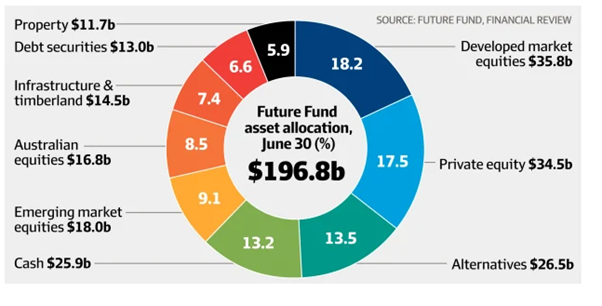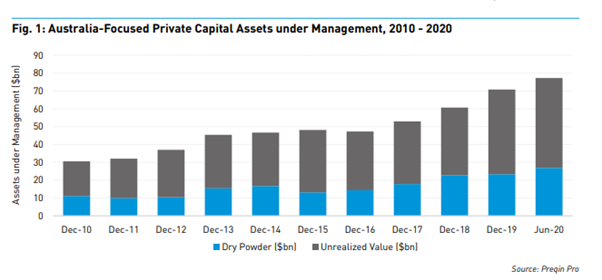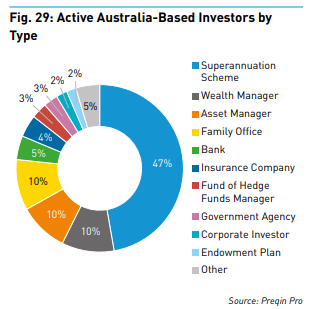Private Equity overview for non-institutional investors

The SILC Group
Peter Costello gave a rather bleak assessment of financial markets in the Australian Financial Review (AFR) where he outlined the reasons behind the increasing allocation of the Future Funds investment into Private Equity. He also highlights the detrimental effects this will have on mum and dad investors’ portfolios.
For the most part, we at The SILC Group agree with his assessment, but disagree with his answer to his own question, “How does your mum or dad get access to a private market? They can’t”.
For retail investors, investments into private markets are usually wholesale products only, but for the affluent mums and dads and middle-market investors, we believe that the private market is well and truly open to business.

Private Equity has since evolved since the Leveraged Buy Out (LBO) frenzy of the ’80s to become a reliable and accessible asset class, while holding its position as one the top performing allocations to many investors’ portfolios.
In Australia, Private Equity and Venture Capital have been outperforming public markets for the last 5, 10 and 20 years, as per the below graphic from Cambridge Associates.

Preqin also tells us that dry powder (cash or liquid assets on hand for deployment) is at a record high $27b as at June 2020. Couple the war chest of dry powder with record low interest rates, high valuations in equities, and a growing list market and economic concerns, we are likely to see deployment into private markets continue into 2022.

Global Institutions and domestic investors alike are putting their cash to work in private markets. Close to home, we’ve seen Square’s acquisition of Afterpay, Sydney Airport coming under the microscope of a large consortium of investors, Blackstone Group eyeing off Crown Resorts, KKR’s acquisition of Colonial First State from CBA and a host of investors bidding for the Optus tower network.
Australian Private Markets have historically been dominated by the big players. However, the consolidation of superfunds, the introduction of the APRA Heatmap and Foreign Investment Review Board (FIRB), as well as the growth of the industry is opening the door for increased investment from the middle-market and HNW investors.

Many non-institutional investors in Australia are at a loss as to where and how to access Private Equity. As Private Equity refers to investing into companies that are not traded on public exchanges, investors need to consider which of the many avenues they would like to take to gain exposure.
Direct Investment
Investors may source their own opportunities to provide capital directly to a company in exchange for a percentage of the company’s ownership. This un-intermediated approach requires stringent due diligence and screening processes to identify quality opportunities and advisers and portfolio managers may not be resourced to undertake this activity and opt for an alternative.
Private Equity Funds
Private equity funds are managed investment schemes created to invest into unlisted companies. A common structure is that of a unit trust that pools capital sourced from institutional and sophisticated investors to invest into private companies. In the same manner that an investor or portfolio manager may not purchase listed equities, and instead appoint an Investment Manager. The pros to investing into Private Equity via a fund is that you are effectively outsourcing to a professional investor and not having to create internal structures to screen deals. Private Equity Funds are also more likely to have access to a better network of deal flow and see higher quality deals. Cons include fees and illiquidity.
Straight Bat Private Equity’s slogan “play the long game” pays homage not just to their love of cricket, but their investment philosophy which in essence, encapsulates what Private Equity investing is all about. Generally speaking, Private Equity is an illiquid asset class. Illiquidity is often perceived as a detractor, however as I touched on in my previous article, illiquidity reduces volatility and correlation to other asset classes, particularly in stressed markets.
Fund of Funds
A Private Equity fund of funds raises capital from investors and invests into Private Equity Funds, rather than specific companies or deals. The Fund of Fund may target a particular region, size, or sector such as Venture Capital or Special Situations, or firms that invest in a particular size or maturity level of the underlying companies. Investing via this method reduces concentration risk, provides greater exposure, but comes with additional layers of fees.
Co-Investment
Private Equity firms and funds may allow other investors/limited partners (LPs) to take a minority stake into their investments at a discretionary basis. The advantage to the co-investor is they can gain exposure to an investment that a specialist Private Equity firm has undergone due diligence on and is putting their own skin in the game, without giving up the full amount of capital required. Co-investment vehicles are usually structured to govern these investments.
Secondaries
A secondary transaction refers to the exchange of ownership within private equity investments. In many cases, owners, employees, or founding investors in growing companies may wish to cash in on their ownership of the company and sell a portion or all their share to Private Equity firms.
Secondary Funds provide Private Equity exposure while mitigating the J-Curve (the tendency of private equity funds to report negative returns early on, and record increasingly positive returns as the investments mature).
Venture Capital (VC)
Venture Capital (VC) is the provision of capital by VC firms to early-stage companies. Unlike the companies VC firms are on the hunt for, the VC industry in Australia has matured, with KPMG reporting a record US$2.5 billion (AUD$3.4 billion) invested in 2021, up from US$1.95 billion (AUD$2.7 billion) in 2020.
Alongside the rapid growth of the Australian venture ecosystem has come the need for liquidity within it. In more developed markets, specialist "secondaries" funds have evolved to provide this liquidity, however, it was only recently that an Australian and NZ focused venture secondaries fund emerged. Sydney-based, SecondQuarter Ventures, was launched in 2020 with A$51m under management.
As the only venture secondaries fund in the country, Managing Partner, Ian Beatty, says they receive a substantial level of deal flow, which suggests just how valuable this type of liquidity can be in fast-growing tech companies. "Private market journeys can be 10+ years. Having an option for stakeholders to sell some shares along the way is particularly helpful for founders and employees who can start to actually use the value created by their hard work."
Ian says, "We believe our investment model genuinely helps the ecosystem and at the same time provides venture-style returns for our investors. It's a win-win."
Which approach is right for you?
Depending on the bandwidth and expertise of the investment committee, your current exposure and investment philosophy, investors can decide which strategies they would like to incorporate into their portfolio. There is an ever-increasing number of Private Equity products and opportunities coming into the market, and by partnering with the right providers and managers, these can be far more accessible than previously believed.
3 topics

Daniel is a member of the Investment Solutions team at The SILC Group, which offers bespoke investment opportunities, capital raising and trustee services, administration and licensing services for wholesale fund managers.

Daniel is a member of the Investment Solutions team at The SILC Group, which offers bespoke investment opportunities, capital raising and trustee services, administration and licensing services for wholesale fund managers.
